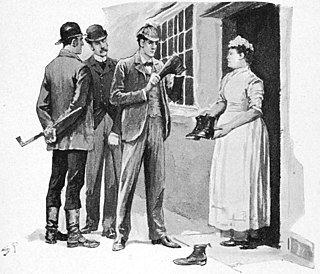
Detective fiction is a subgenre of crime fiction and mystery fiction in which an investigator or a detective—whether professional, amateur or retired—investigates a crime, often murder. The detective genre began around the same time as speculative fiction and other genre fiction in the mid-nineteenth century and has remained extremely popular, particularly in novels. Some of the most famous heroes of detective fiction include C. Auguste Dupin, Sherlock Holmes, and Hercule Poirot. Juvenile stories featuring The Hardy Boys, Nancy Drew, and The Boxcar Children have also remained in print for several decades.

Cecil Day-Lewis, often written as C. Day-Lewis, was an Irish-born, British poet and Poet Laureate from 1968 until his death in 1972. He also wrote mystery stories under the pseudonym of Nicholas Blake.

Mystery is a fiction genre where the nature of an event, usually a murder or other crime, remains mysterious until the end of the story. Often within a closed circle of suspects, each suspect is usually provided with a credible motive and a reasonable opportunity for committing the crime. The central character is often a detective, who eventually solves the mystery by logical deduction from facts presented to the reader. Some mystery books are non-fiction. Mystery fiction can be detective stories in which the emphasis is on the puzzle or suspense element and its logical solution such as a whodunit. Mystery fiction can be contrasted with hardboiled detective stories, which focus on action and gritty realism.

A Pocket Full of Rye is a work of detective fiction by Agatha Christie and first published in the UK by the Collins Crime Club on 9 November 1953, and in the US by Dodd, Mead & Co. the following year. The UK edition retailed at ten shillings and sixpence (10/6) and the US edition at $2.75. The book features her detective Miss Marple.
Nigel Strangeways is a fictional British private detective created by Cecil Day-Lewis, writing under the pen name of Nicholas Blake. He was one of the prominent detectives of the Golden Age of Detective Fiction, appearing in sixteen novels between 1935 and 1966. He also features in a couple of short stories.

The Sad Variety is a 1964 thriller novel written by the Anglo-Irish writer Cecil Day-Lewis, written under the pen name of Nicholas Blake. It is the fifteenth and penultimate entry into the series featuring the private detective Nigel Strangeways. It marked a move away from the murder mysterys of the earlier novels into the then-fashionable spy novel genre.
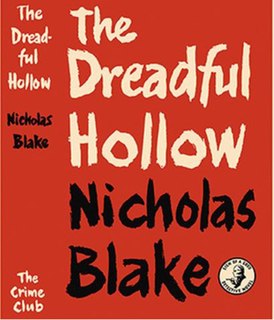
The Dreadful Hollow is a 1953 detective novel by Cecil Day-Lewis, written under the pen name of Nicholas Blake. It is the tenth in a series of novels featuring the private detective Nigel Strangeways.

There's Trouble Brewing is a 1937 detective novel by Cecil Day-Lewis, written under the pen name of Nicholas Blake. It is the third in a series of novels featuring the private detective Nigel Strangeways.

The Worm of Death is a 1961 detective novel by the Anglo-Irish writer Cecil Day-Lewis, written under the pen name of Nicholas Blake. It is the fourteenth in a series of novels featuring the private detective Nigel Strangeways.

The Widow's Cruise is a 1959 British detective novel by Cecil Day-Lewis, written under the pen name of Nicholas Blake. It is the thirteenth in a series of novels featuring the private detective Nigel Strangeways.

The Morning after Death is a 1966 detective novel by Cecil Day-Lewis, written under the pen name of Nicholas Blake. It is the sixteenth and last entry in the series of novels featuring the private detective Nigel Strangeways.

The Whisper in the Gloom is a 1954 detective novel by Cecil Day-Lewis, written under the pen name of Nicholas Blake. It is the eleventh in a series of novels featuring the private detective Nigel Strangeways. The novel introduced the recurring character of Clare Massinger, a young sculptress, who becomes a romantic interest of Strangeways.

A Penknife in My Heart is a 1958 crime thriller novel by Cecil Day-Lewis, written under the pen name of Nicholas Blake. It was one of four stand-alone novels he wrote alongside the Nigel Strangeways detective novels.
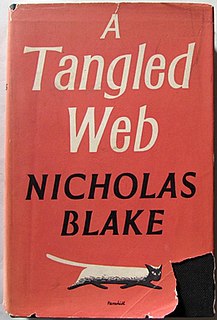
A Tangled Web is a 1956 British crime novel by Cecil Day-Lewis, written under the pen name of Nicholas Blake. It was one of four stand-alone novels he wrote under the name alongside the Nigel Strangeways detective novels. It was published by Harper in the United States under the alternative title Death and Daisy Bland.
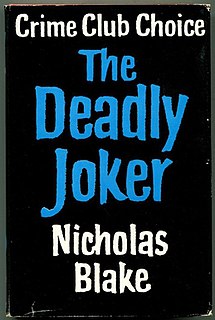
The Deadly Joker is a 1963 mystery novel by the Anglo-Irish writer Cecil Day-Lewis, under his pen name of Nicholas Blake. It was one of four stand-alone novels he wrote under the name alongside the Nigel Strangeways detective novels. It is unusual for the author for being written in a first person narrative from the prospective of the protagonist John Waterson.
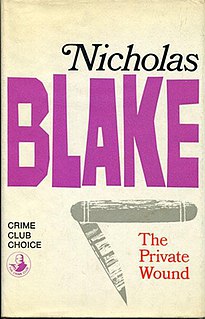
The Private Wound is a 1968 mystery thriller novel by Cecil Day-Lewis, written under the pen name of Nicholas Blake. It was one of four stand-alone novels he wrote alongside the Nigel Strangeways detective novels. The title is taken from a line in William Shakespeare's Two Gentlemen of Verona. It was a runner-up for the Gold Dagger Award of the British Crime Writers' Association.
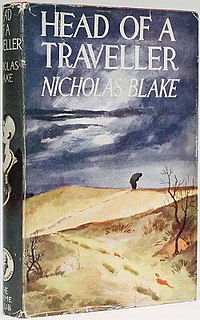
Head of a Traveller is a 1949 detective novel by Cecil Day-Lewis, written under the pen name of Nicholas Blake. It is the ninth in a series of novels featuring the private detective Nigel Strangeways.

A Question of Proof is a 1935 detective novel by Cecil Day-Lewis, written under the pen name of Nicholas Blake. It is the first in a series of novels featuring the private detective Nigel Strangeways. Day-Lewis chose to write under an assumed name as he feared writing in the popular detective genre would harm his growing reputation as a serious-minded poet. Consequently, the publishers Collins advertised the book as being written by a "well-known writer" using a pen name. It was a commercial success selling around 200,000 copies in Britain and launching Day-Lewis, who quickly did become widely identified as the author, as one of the leading writers of the Golden Age of Detective Fiction.

Death at the Club is a 1937 detective novel by the British writer Cecil Street, writing under the pen name of Miles Burton. It is the fifteenth in a series of books featuring the amateur detective Desmond Merrion and Inspector Arnold of Scotland Yard. It was published in the United States by Doubleday the same year under the alternative title The Clue of the Fourteen Keys. It takes the form of both a locked room mystery and a closed circle of suspects, both popular branches of the genre during the decade.
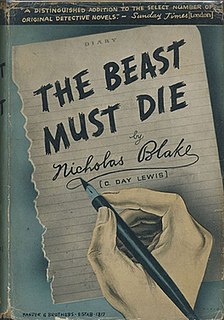
The Beast Must Die is a 1938 detective novel by Cecil Day-Lewis, written under the pen name of Nicholas Blake. It combines elements of the inverted thriller with a classic Golden Age-style investigation. It is the fourth in a series of novels featuring the private detective Nigel Strangeways. The title is inspired by a line in Four Serious Songs by Johannes Brahms, itself a reference to Ecclesiastes.



















